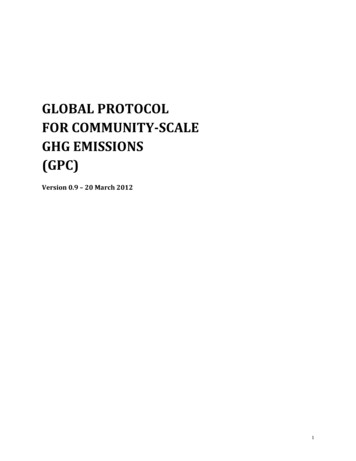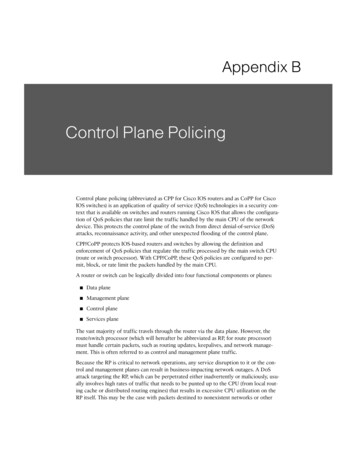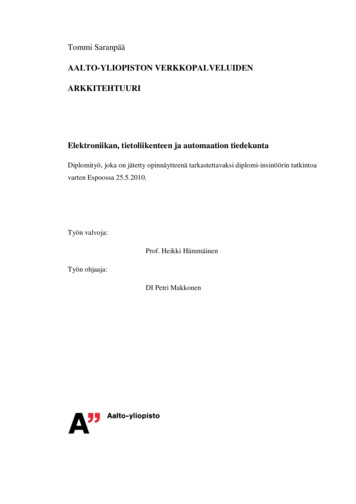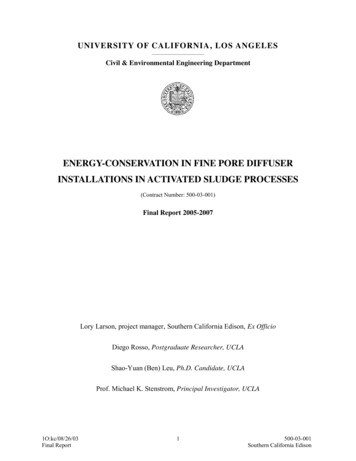
Transcription
GLOBAL PROTOCOLFOR COMMUNITY-SCALEGHG EMISSIONS(GPC)Version 0.9 – 20 March 20121
GLOBAL PROTOCOL FOR COMMUNITY-SCALE GHG EMISSIONS (GPC)Prepared by: C40 Cities Climate Leadership Group and ICLEI Local Governments for SustainabilityIn collaboration with: World Bank, UNEP, UN-HABITAT, World Resources InstituteLead Authors: Yunus Arikan (ICLEI), Rishi Desai (C40)Authors: Jonathan Connor (ICLEI), Alden Feldon (ICLEI), Amanda Eichel, Brooke Russell (C40), JonathanDickinson (New York City), Dan Hoornweg (World Bank), Pankaj Bhatia, Wee Kean Fong (WRI), Ian Shearer(ICLEI)The authors would like to extend special thanks to:Chris Kennedy (University of Toronto), Garrett Fitzgerald (City of Oakland - Chair of ICLEI US CommunityProtocol Steering Committee), Seth Schultz (C40), Julianne Baker Gallegos (World Bank)Design of GPC is specified within the scope of the Memorandum of Understanding that was signed betweenICLEI – Local Governments for Sustainability and C40 Cities Climate Leadership Group on 1 June 2011 in SaoPaulo.
GLOBAL PROTOCOL FOR COMMUNITY-SCALE GHG EMISSIONS (GPC)Executive Summary .11. Introduction .41.1 Key Challenges . 62. Components of GPC .72.1 Guiding Principles and Policy Framework . 72.1.1 GPC Guiding Principles . 82.1.2 GPC Policy Framework . 92.2 Emissions Sources and Boundaries .112.3 The 2012 Accounting and Reporting Standard (2012 Standard) .132.3.1 Limitations in the 2012 Standard .172.3.2 Provision of Summary Reporting Templates .202.4 Evolution of the Accounting and Reporting Standard Over Time .253. Accounting Guidance . 26Overview of Accounting Guidance .26Developing Complete Data .26A. Stationary Units . 31A.1 Stationary Units: Direct Emissions from Stationary Fuel Combustion .31A.2 Stationary Units: Indirect Emissions from Grid-Supplied Energy Consumption .34A.3 Energy Generation .38B. Mobile Units . 41B.1 On-Road Transportation .41B.2 Railways (Including urban metro/rail transport systems) .44B.3 Water-Borne Navigation .48B.4 Aviation .50B.5 Off-road .52C. Waste . 55C.1 Landfilled MSW .57C.2 Incinerated MSW .58C.3 Biologically Treated MSW .59C.4 Apportioning In-Boundary Emissions .60C.5 Wastewater Treatment and Handling .60D. Industrial Process and Product Use Emissions . 67D.1 Industrial Processes .67D.2 Product Use .69Appendix A – Guidance for Data Collection and Future Verification . 70References. 73i
GLOBAL PROTOCOL FOR COMMUNITY-SCALE GHG EMISSIONS 282930313233343536373839404142Executive SummaryThe Global Protocol for Community-Scale Greenhouse Gas Emissions (GPC) is a multi-stakeholder,consensus-based protocol for developing internationally recognized and accepted community-scalegreenhouse gas accounting and reporting standards. It is the result of a year-long collaborationbetween ICLEI – Local Governments for Sustainability and C40 Cities Climate Leadership Group; on 1June 2011, the two organizations forged an agreement to develop a standard approach for accountingand reporting GHG emissions that will boost cities’ ability to access funding and implement actions.Other core partners that participated in the development of GPC include the World Bank Group, UnitedNations-HABITAT, United Nations Environment Program, the Organization for Economic Cooperationand Development, and the World Resources Institute.To manage emissions, cities must measure them. To extend the global impact of local efforts, cities mustreport them publicly as well. Planning for climate action at the city level1 starts with developing a GHGinventory, which allows local policy makers and residents to understand which sectors drive GHG emissionsin their city or community, and respond by developing action plans that address those sectors. To date therehas not been consistent accounting and reporting guidance for cities on how to conduct community scaleinventories. In fact, competing guidance has resulted in a proliferation of “protocols” and inventories thatcannot be easily communicated between financing institutions, local and national governments, and theprivate sector. Lack of a common approach prevents comparison between cities and across time, and reducesthe ability of cities to demonstrate the global impact of collective local actions.Harmonization of GHG accounting methodologies presents local governments with opportunities for crediblereporting of climate data in a transparent, verifiable, consistent, and locally relevant way. An internationallyrecognized GHG accounting standard which harmonizes prevailing methodologies can help local governmentsto set targets, measure progress, and leverage national and international financing. 2,3 Common accountingand reporting methods by local governments improve policy coordination and dissemination of best practicesbetween local governments facing comparable climate-related challenges, and facilitating climate-linkedfinance through a verifiable, common standard. Further, globally adopted standards provide for accurate andfaithful inventorying and documentation in accounting and reporting of activities of the community resultingin emissions released in other communities (e.g. waste disposed of in landfills in other communities, orregional transportation systems) -- a complex issue that is unique to the community-scale.The Global Protocol for Community-Scale Greenhouse Gas Emissions (GPC) builds upon the principles,knowledge, experiences, and practices defined in previously published city-led inventories, institutionalstandards, and organizational protocols. These chiefly include the International Local Government GHGEmissions Analysis Protocol (ICLEI), the Draft International Standard for Determining Greenhouse GasEmissions for Cities (UNEP/UN-HABITAT/WB), the GHG Protocol Standards (WRI/WBCSD), the BaselineEmissions Inventory/Monitoring Emissions Inventory methodology (EC-CoM JRC), and the Local GovernmentOperations Protocol (ICLEI-USA). The lessons from these efforts show that three core challenges remain.Challenge 1: Developing a community-scale GHG accounting and reporting standard that attributesemissions to the activities of the community.1 Also referred to as the community-scale, city-scale, local level, sub-national area, local government jurisdiction, amongst other terms.2 See Kennedy, Ramaswamiet. al. (2009) Greenhouse Gas Emission Baselines for Global Cities and Metropolitan Regions3 OECD Working Party Paper(2011)1
GLOBAL PROTOCOL FOR COMMUNITY-SCALE GHG EMISSIONS (GPC)123456Challenge 2: Harmonizing existing community-based GHG accounting methodologies andstandardizing accounting, reporting, and the relationships of community-scale inventories withnational, organizational, and global climate efforts.Challenge 3: Advancements in GHG accounting methodologies at the community-scale arecontinuously evolving. An open, global protocol must therefore include a process for revising thestandard to meet the inevitable improvements of tomorrow.78910111213In response to these challenges, GPC has several main components. It addresses complexities associated withaccurate reflection of a community’s GHG emissions including production, consumption and inter-cityemissions for transport, waste and energy through an accounting framework GPC provides a template toexplicate the relationship with national and organizational GHG accounting methodologies, allocating allcommunity activities and services that may result in GHG emissions, including inter-city emissions, tocategories defined by the 2006 IPCC Guidelines and by Scope definition, to reflect varying levels of control bythe community over these 34353637383940414243GPC introduces a community-scale GHG accounting standard, the 2012 Accounting and Reporting Standard,which harmonizes GHG accounting methodologies, and provides step-by-step guidance for cities on how tocollect relevant data, quantify emissions, and report results using a series of summary reporting templates.Data collection for reporting is guided through use of data collection tables, providing transparency in activitydata, emissions factors, and data sources. Through the 2012 Standard, GPC enhances local policydevelopment by benchmarking emissions between cities to facilitate peer-to-peer networking and sharing ofbest practices; by allowing for consistent measurement of a community’s GHG emissions over time toevaluate various GHG abatement efforts; and lastly by facilitating climate-linked finance. Two types ofsummary reporting templates can be generated by cities using the 2012 Standard: 1) Community GHG Profilesthat enable local government leaders to make policy-relevant conclusions for local climate mitigation andadaptation actions, and are comparable across cities; and 2) National Aggregation Reports, that are consistentwith IPCC reporting guidelines and facilitate linkages with national and international climate processes.444546Local government leaders stand to benefit from successfully completing a Community GHG Inventory incompliance with GPC. They will establish a consistent benchmark for current levels of GHG emissions at thecommunity level, allowing for accurate monitoring of progress towards emission reduction targets. They willCore GPC partners have institutionalized the process for updating and revising the 2012 Standard. GPC isdesigned to evolve with the advances to collect, account for, and report community-scale activity data,emissions factors, and the resulting GHG emissions. The accounting standard and associated processes setforth by GPC adhere to and balance the needs of six guiding principles, which have been defined through aprocess of consultation with GPC partners and city stakeholders:1.2.3.4.5.6.Measurability: Data required to perform complete emissions inventories should be available; wherenecessary partners will work with communities to develop local capacity communities to enable fordata development and collection for compliance with the 2012 Accounting Standard.Accuracy: The calculation of GHG emissions should not systematically overstate or understate actualGHG emissionsRelevance: The reported GHG emissions should reflect emissions occurring as a result of activitiesand consumption from within the community’s geopolitical boundariesCompleteness: All significant emissions sources included should be accounted forConsistency: Emissions calculations should be consistent in approachTransparency: Activity data, sources, emissions factors and accounting methodologies should bedocumented and disclosed2
GLOBAL PROTOCOL FOR COMMUNITY-SCALE GHG EMISSIONS (GPC)12345have a standard mechanism for evaluating the climate impacts as local governments pursue environmentalreview and related processes. They will generate more actionable and policy-relevant data and thereforeimprove cost and benefit analyses for policy making; and, finally, they will be able to link communityinventories to national and global inventory processes.67For these reasons, GPC is a significant achievement; its launch and implementation puts the world’s cities oncourse for more effective climate action planning and execution.83
GLOBAL PROTOCOL FOR COMMUNITY-SCALE GHG EMISSIONS 2829303132333435361. IntroductionCities are rapidly growing as centers of innovation, energy consumption, population, -- and as sources ofgreenhouse gas (GHG) emissions. Projections show that by 2050 over 75% of the world’s population will livein cities. Although cities already account for more than 70% of the world’s emissions, they are also showingsignificant leadership in taking climate action to mitigate their emissions.To manage emissions, cities must measure them. To extend the global impact of local efforts, cities mustreport them publicly as well. Planning for climate action at the city level4 starts with developing a GHGinventory, which allows local policy makers and residents to understand which sectors drive GHG emissionsin their city or community, and respond by developing action plans that address those sectors. To date therehas not been consistent guidance for cities on how to conduct community scale inventories. In fact,competing guidance has resulted in a proliferation of “protocols” and inventories that cannot be easilycommunicated between financing institutions, local and national governments, and the private sector Lack ofa common approach prevents comparison between cities and across time, and reduces the ability of cities todemonstrate the global impact of collective local actions.Analysis of prevailing community-scale GHG accounting methodologies, using transparent city-ledinventories, concludes that the current methodologies are “remarkably similar” from the perspective of directemissions (including energy consumption, and certain trans-boundary emission-causing activities).5Harmonization of GHG accounting methodologies will allow for credible reporting of climate data in atransparent, verifiable, consistent, and locally pragmatic fashion. An internationally recognized GHGaccounting standard which harmonizes prevailing methodologies can help local governments to set targets,measure progress, and leverage national and international financing in a consistent and verifiable way.6,7Common accounting and reporting methods by local governments improves policy coordination anddissemination of best practices between local governments facing comparable climate-related challenges, andfacilitates climate-linked finance through a verifiable, common standard. Further, globally adopted standardsfor accounting and reporting of inter-city activities and emissions provides for accurate and faithfulinventorying and documentation of emissions across jurisdictions, a complex issue especially unique tocommunity-scale measurement.GPC efforts began to resolve the remaining differences between existing protocols, with a joint missionbetween all interested stakeholders to develop an open, global protocol for community-scale accounting andreporting standards. As a result, the Global Protocol for Community-Scale GHG Emissions is based upon theknowledge embedded within the history of relevant GHG inventorying efforts:Year1990199219951996Chronology of relevant effortsFirst Assessment Report of IPCC (FAR)Adoption of UNFCCC (no specific definition of greenhouse gases)Second Assessment Report of IPCC (SAR)IPCC 1995 Guidelines for GHG InventoriesIPCC Guidelines and Good Practice Guidance for GHG Inventories4 Also referred to as the community-scale, city-scale, local level, sub-national area, local government jurisdiction, amongst other terms.5 See Kennedy et. al. (2011) Greenhouse Gas Emissions from Cities, Comparison of International Inventory Frameworks6 See Kennedy, Ramaswamiet. al. (2009) Greenhouse Gas Emission Baselines for Global Cities and Metropolitan Regions7 OECD Working Party Paper(2011)4
GLOBAL PROTOCOL FOR COMMUNITY-SCALE GHG EMISSIONS doption of Kyoto Protocol (Annex-A lists specific GHGs and sectors)First Global IEA Report on CO2 Emissions from Fuel CombustionLaunch of the Greenhouse Gas ProtocolMarrakech AccordsGHG Protocol Corporate Accounting and Reporting Standard (First Edition)ThirdAssessment Report of IPCC (TAR)GHG Protocol Corporate Accounting and Reporting Standard (Revised Edition)Formation of the C40 Cities Climate Leadership Group by London Mayor KenLivingstone (C20 then)Launch of European Emissions Trading Scheme ETSRelease of ISO14064 StandardIPCC Revised GuidelinesFirst Global Report of Cities for Climate Protection CampaignPartnership between C40 and Clinton Climate Initiative (CCI) announcedLaunch of European Covenant of MayorsFourth Assessment Report of IPCCLaunch of Global City Indicators Facility and The Climate Registry in the USRelease of US Local Government Operations Protocol (LGOP)Launch of ICLEI-US/CDP Cities Pilot ProjectLaunch of International Local Government GHG Emissions Analysis Protocol (IEAP)Launch of Greenhouse gas Regional Inventory Project (GRIP)Launch of Bonn Center for Local Climate Action and Reporting (carbonn)Kick-off for ISO/TR14069Launch of WB/UNEP/UNHABITAT Draft StandardLaunch of carbonn Cities Climate Registry (cCCR)Kick-off for drafting of US Community GHG ProtocolRelease of C40/CDP Cities ReportICLEI-C40 MoU to design and develop GPCRelease of GHG Protocol Corporate Value Chain (Scope3) Accounting and ReportingStandardRelease of 2011 Annual Report of carbonn Cities Climate Registry125
GLOBAL PROTOCOL FOR COMMUNITY-SCALE GHG EMISSIONS (GPC)12341.1 Key ChallengesChallenge 1: Developing a community-scale GHG accounting and reporting standard which attributesemissions to the activities of the community.567891011121314Local governments can play an important role in managing, influencing and reducing direct and indirectemissions resulting from community consumption of energy and goods. This role can be enhanced ifemissions attributed to the activities of a local government are reported in one single community inventory.When reducing scale of GHG analysis to the boundaries of a local government, issues of attribution arise asactivities of any one community often result in the release of GHG emissions outside the boundary of thatcommunity (indirect 43536Many local governments have already started accounting and reporting their community’s GHG emissionsand most use existing standards and protocols (including those published by partners in the development ofthis standard), designed for corporate or national GHG accounting and reporting. The methods cover andemphasize different sectors and geographic scales. Other organizations have published community-scaleaccounting protocols, all with few but significant differences. However, the differences between existingefforts are not so vast that they cannot be harmonized into one open, global standard. Further, a standardthat also provides for the appropriate linking to IPCC 8 categories and clarity on the integration of Scopes9would facilitate interpretation and comparison of existing inventories while GPC is adopted over time. Anenhanced guidance on Scope definitions and appropriate allocation of each community activity and emissionssource to respective IPCC categories is essential for full integration with national GHG reporting.Challenge 2: Harmonizing existing community-based GHG accounting methodologies andstandardizing accounting, reporting, and the relationships of community-scale inventories withnational, organizational, and global climate efforts.Challenge 3: Advancements in GHG accounting methodologies at the community-scale are continuouslyevolving. An open, global protocol must therefore include a process for revising the standard to meet theinevitable improvements of tomorrow.The global climate community regularly updates definitions of sources and types of GHGs, as well asemissions and removals processes. Such advancements should be reflected at the accounting and reporting ofcommunity-scale GHG emissions as well. Furthermore, the recent progress achieved through global climateprotection negotiations supports the need to capitalize on efforts of local governments through a recognizedemissions inventory approach.Intergovernmental Panel on Climate Change: ‘assesses the scientific, technical and socio-economic information relevant for theunderstanding of the risk of human-induced climate change.’9 Scopes are categorizations of emissions based upon the level of control the inventorying body has over the activities resulting inemissions and emissions themselves. They are clarified with respect to community-scale inventories in 2.1.4 below.86
GLOBAL PROTOCOL FOR COMMUNITY-SCALE GHG EMISSIONS 28293031323334353637383940414243442. Components of GPCThe Global Protocol for Community-Scale Greenhouse Gas Emissions (GPC or community protocol) is a multistakeholder developed, consensus-based protocol for completing internationally recognized and acceptedcommunity-scale greenhouse gas accounting and reporting standards. GPC harmonizes existingmethodologies building upon the knowledge, experiences, and practices defined in previously publishedinstitutional standards, and organizational protocols, but also incorporates city-led inventory efforts. Theexisting standards and protocols chiefly include the International Local Government GHG Emissions AnalysisProtocol (ICLEI), the Draft International Standard for Determining Greenhouse Gas Emissions for Cities(UNEP/UN-HABITAT/WB), the GHG Protocol Standards (WRI/WBCSD), the Baseline EmissionsInventory/Monitoring Emissions Inventory methodology (EC-CoM JRC), and the Local Government OperationsProtocol (ICLEI-USA). By incorporating city-led efforts in its design, GPC leverages a more pragmatic policyframework for a more robust community-scale standard.There are several main components of the Global Protocol for Community-Scale GHG Emissions:1.2.3.4.Guiding Principles and Policy FrameworkEmission Sources and Boundaries2012 Accounting and Reporting StandardInstitutionalized Future Updates to the 2012 StandardThese components address the key challenges, delineated in section 1.2 above which were identified througha year-long review of existing protocols and consultation with city stakeholders (resulting in the policyframework) – and they are interconnected: the policy framework and principles guide the ongoing effort toupdate the 2012 Standard to match advancements made to collect, account for, and report community-scaleactivity data, emissions factors, and the resulting GHG emissions.2.1 Guiding Principles and Policy FrameworkIn addition to the harmonization of different protocols, what is new and significant about GPC is that itprovides for the first time ever a policy framework that links and thereby strengthens community-scale,private sector and national government efforts. Moreover, the community protocol articulates a set ofprinciples that guides these connected efforts as well as the continual improvement and refinement of the2012 Standard.GPC supports four major needs identified for performing local GHG inventories:Policy Development: addressing key sources of community-scale emissions, where localgovernments have the greatest opportunity to reduce these emissionsComparison: allowing for comparisons of GHG emissions between communities, and consistentmonitoring of a community’s own emissions over timeUnderstanding Behaviour Choices: promoting an understanding of how consumer demandthrough individual consumption choices and patterns link to rises in global emissions levelsAggregation: enabling aggregation of community emissions at the sub-national or national level,without double counting of emissions sources, in order to facilitate national reporting and betterinform global climate mitigation processes4546477
GLOBAL PROTOCOL FOR COMMUNITY-SCALE GHG EMISSIONS 28293031323334353637383940414243442.1.1 GPC Guiding PrinciplesThe community protocol adheres to and balances the needs of six guiding principles identified through thepolicy framework:Measurability: At a minimum, data required to perform complete emissions inventories should bereadily available.The data required to support completion of an inventory should be readily available or made available withinreasonable time and/or cost. Data sources are to be accessible for reliable updates at regular intervals tomeet periodic inventorying efforts. Partners have committed to work with communities to develop localcapacity to enable data development and collection necessary for compliance with the Standard.Accuracy: The calculation of GHG emissions should not systematically overstate or understate actualGHG emissions.Accuracy should be sufficient to give decision makers and the public reasonable assurance of the integrity ofthe reported information. To address accuracy, GPC supports benchmarking of input/output data andreporting against relevant benchmarks (where feasible).Relevance: The reported GHG emissions should reflect emissions occurring as a result of activities andconsumption from within the community’s geopolitical boundaries,Local governments should be able to develop policy to address GHG emissions occurring from activitiesundertaken within the boundary or goods and services consumed by the community. GPC is designed tosupport continued innovations in efforts to reduce emissions, thus encourages local governments to identifyand report relevant emissions sources with a goal of supporting policy development and planning processesthat reduce community energy consumption and mitigate GHG emissions.Completeness: All significant emissions sources in
GLOBAL PROTOCOL FOR COMMUNITY-SCALE GHG EMISSIONS (GPC) 1 1 Executive Summary 2 The Global Protocol for Community-Scale Greenhouse Gas Emissions (GPC) is a multi-stakeholder, 3 consensus-based protocol for developing internationally recognized and accepted community-scale 4 greenhouse gas accounting and reporting standards. It is the result of a year-long collaboration









